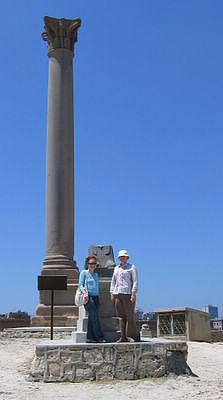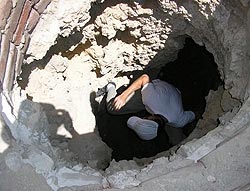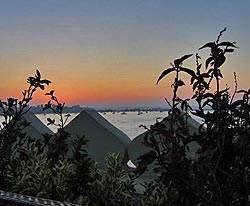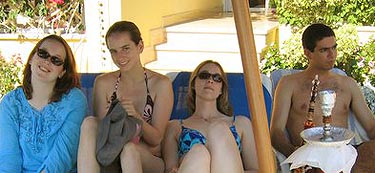ALEXANDRIA, EGYPT — Weekends in Egypt start on Friday, when Muslims gather at the mosque to pray together. On Friday mornings, people often stay in bed late, sleeping off the week and getting ready for the family gatherings that start in the evening and often last quite late into the night. Because of this, Friday mornings in Cairo are lovely - the streets are empty, the shops are closed, and the cabs are fewer and farther between. Fortunately, Kelly and I were able to find one to take us to the university, where we met the bus and started our overnight field trip to the city of Alexandria, on the Mediterranean Sea.
The ride from Cairo to Alex, as the locals call it, is about four hours through the desert. Halfway there, we stopped at a rest stop that resembled a carnival - Egyptian families scurrying around buying fruit, souvenirs, CDs, water, and french fries from kiosks set up on the scrubby lawn in front of the gas station and food court. I took the opportunity to ask some of my classmates to name their favorite Arab pop singers: Nancy Agram, Elissa, and Amr Diab topped the list.
 Kelly and I in front of "Pompey's Pillar," which actually has nothing to do with Pompey; it was erected in AD 293 for Diocletian. |
|
 The ruins of one of many Roman amphitheaters in Alexandria; the Romans ruled the city (founded by Alexander the Great in the 4th century BC), from 80 BC to AD 641, when the Arabs conquered it. |
|
 Steve goes exploring down a cistern, but finds only dusty passageways and a few soda cans. |
While inside the catacombs, walking through odd cavernous rooms carved from rock and decorated with reliefs that mix Pharaonic and Greek art, I saw my first group of Western tourists in Egypt. They began to follow us, no doubt hoping to benefit from the explanations of our tour guide; they looked very surprised when the teacher began giving us the explanations entirely in Arabic.
At Pompey's Pillar we got into a little bit of trouble. One of the CASA fellows, Steve McInerney, who hails from North Carolina and has done some rock-climbing in the past, found a shaft that led down to interlocking tunnels. He climbed down but couldn't see anything, so had come back up asking for a flashlight. I offered him my camera, hoping that he could use the flash in order to orient himself. He descended the 20 feet or so, and disappeared.
After about 15 minutes, we all got nervous. The bus was ready to go, the guides were rounding all of us up, and Steve was nowhere to be seen. The responsible parties were scurrying about the acropolis, peering inside cisterns and calling Steve's name. They had not seen him go into the hole and thought that perhaps he was playing a trick on us. He wasn't, and emerged from a cistern several hundred feet away after a few more minutes. We hurried back to the bus where I was able to see the pictures that Steve had taken as he lit his way. They were less exciting than I had hoped — nothing but dark hallways and a Coke can here and there.
Because we are year-long residents in Egypt, we get iqaama, or resident's visas, that allow us to pay Egyptian instead of tourist rates for hotels. This means that staying in a four-star hotel is possible even on a student's budget. We were placed in the Windsor Palace hotel, a belle époque beauty built in 1907 and refurbished in the '90s. The balcony of my room had an amazing view of the Mediterranean, and the bathroom had a bidet to wash my dirty feet in. (Yes, I know what a bidet is actually intended for, but my feet were very dirty and it was just the right size and shape!)
 The view at sunset from our rooftop restaurant. |
In Cairo it is very rare to spot a woman in a café, but in Alexandria the restaurants are filled with women with families, women in groups, and even women alone. Kelly and I seized the opportunity to spend the evening sitting on the sidewalk of a seaside café, enjoying the breeze, drinking tea with sugar and fresh mint leaves, and chatting with the locals. People were very interested in Kelly and me - two obviously Western girls speaking and reading Arabic (we had our homework with us). I get frustrated sometimes when people will only speak to me in English, but I have discovered a new way to solve the problem. Some of the other students lie and say they are from other countries: Norway, Sweden - anywhere with a language that is not commonly known - but I have just started insisting, no matter how well a person speaks English, that I don't understand them. I smile, and apologize, and most of the time they will then switch to Arabic very quickly.
One of the people with whom I spoke was a 10-year-old Alexandrian boy named Ahmed. He came over to ask me where I was from and why I was reading Arabic, then ran back to his family to report the findings. When he returned he brought his sister, 11-year-old Sarah, to join us. We sat and talked about Egypt and America, about their favorite American singers and actors, and about why I am studying Arabic. Periodically Ahmed would pipe up with a pointed political question: "Why does the U.S. give money to Israel?" Before I could say anything, Sarah would interrupt with a question about how I like Egypt, if the locals are nice, or what my favorite foods are.
 The view of Alexandria from the Fortress of Qaitbey, built on the site of the Pharos lighthouse after it was destroyed in an earthquake. The lighthouse was the model for the rest of the world's lighthouses. |
|
 Making friends with the police. |
We ended our trip with an afternoon at a luxurious oceanside resort, swimming at their private beach and smoking sheesha (flavored tobacco from one of those elaborate water pies) by the pool. It wasn't my first time swimming in the Mediterranean - I've been to the south of France - and I am sure it won't be my last. Alexandria has completely enchanted me, and I hope to spend many weekends there in the fall. It is the perfect escape from the heat and noise of Cairo.
—Pamila
Pamila Pengra graduated from UC Berkeley in May 2005 with a B.A. in linguistics. She is studying Arabic in Cairo on a CASA fellowship.





